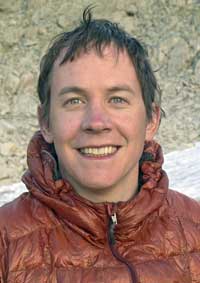Cooperation Professorship: Alfred-Wegener-Institut Potsdam
Earth Systems Diagnostics
Prof. Dr. Thomas Laepple

We characterize the state and dynamics of the earth system in order to understand and better predict its future evolution under human influence.
Contact
Telefon +49 331 58174-5602
Thomas.Laepple awi.de
awi.de
https://www.awi.de/en/about-us/organisation/staff/single-view/thomas-laepple.html
Working Area
How is climate variability likely to change in the future? And what aspects of these changes are a direct result of human influence and, therefore, predictable? What uncertainties remain in our projections of cli-mate change and other earth system variables? Must we expect the unexpected? And how are extreme (weather) events likely to develop in the future? These are some of the questions that our working group seeks to answer through the analysis of instrumental and paleo-proxy observations.Methods
Our research requires knowledge of the earth system of preindustrial periods and of longer time-periods than those covered by instrumental observations. We thus rely on natural environmental archives such as marine sediment cores or ice-cores. My interdisciplinary research group combines and develops new methodologies from the fields of physics, statistics and geosciences to enhance the use of paleo-environmental archives records for quantitative earth system research.Contact
Telefon +49 331 58174-5602
Thomas.Laepple
 awi.de
awi.dehttps://www.awi.de/en/about-us/organisation/staff/single-view/thomas-laepple.html
(Only in German)
Anstellungen/Aufenthalte:
2005 Visiting Scholar, National Center for Atmospheric Research, Boulder, Colorado
2007-2009 Consulting Services, Climate/Weather Risks for Risk Management Solutions, London, UK
2009-2013 Post-Doc, AWI Bremerhaven
2011 Feodor Lynen Postdoctoral Fellow, Harvard University
Seit 2013 Leiter Helmholtz-Nachwuchsgruppe ECUS, AWI Potsdam
Seit 2017 Leiter, ERC Starting Grant SPACE
seit 2019 Kooperationsprofessur Universität Bremen & AWI Potsdam
Forschungsgebiete:
Quantitative Analyse von Paleo-Proxy Daten; Klimastatistik, Klimavariabilität
Anstellungen/Aufenthalte:
2005 Visiting Scholar, National Center for Atmospheric Research, Boulder, Colorado
2007-2009 Consulting Services, Climate/Weather Risks for Risk Management Solutions, London, UK
2009-2013 Post-Doc, AWI Bremerhaven
2011 Feodor Lynen Postdoctoral Fellow, Harvard University
Seit 2013 Leiter Helmholtz-Nachwuchsgruppe ECUS, AWI Potsdam
Seit 2017 Leiter, ERC Starting Grant SPACE
seit 2019 Kooperationsprofessur Universität Bremen & AWI Potsdam
Forschungsgebiete:
Quantitative Analyse von Paleo-Proxy Daten; Klimastatistik, Klimavariabilität

